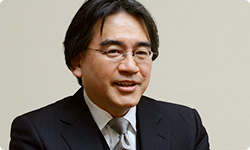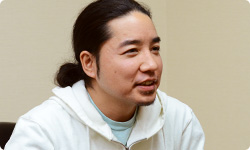3. A Very Personal FF Experience
Were you already familiar with Indies Zero before they began developing THEATRHYTHM FINAL FANTASY?

Masanobu Suzui, the president of Indies Zero, worked under me back in the Bandai days. He was there for a year before going independent.
So that was how you first met him?
Yes. When I started working in merchandising, I got him to produce an FF trading card game for us. That was back in the days of FFIX13, but the genuine love he had for the series stayed with me, so when it came to this project, Indies Zero was the only choice, really. 13 Final Fantasy IX is the ninth instalment in the series. It was released by Squaresoft (now Square Enix) in Japan in July 2000.
So many random events, but it actually seems like a lot of things came together very nicely. It’s almost as if this game was meant to be made! (laughs)
Yes, it does feel a bit like that. A lot of the connections I made over the years finally came together on this one. I hadn’t thought about it until now. (laughs)
Were there any obstacles you came up against in making a game based almost entirely around music and visuals? And were you able to capitalise on the creative power that the FF brand name carries in overcoming them, or was it a great struggle?
At least in terms of how we would present things, it was the latter. And because of the weight that the FF brand name carries, it was all too easy to start worrying about how the fans were going to react. For example, we were concerned that if we only showed still images at press conferences and so forth, they might write it off as merely being a completely different title packaged under the Final Fantasy banner.
Yes, it’s difficult when you have a lot of extremely passionate fans. But when we put the demo up on Nintendo eShop, the response was good - people were saying it made them want to play Final Fantasy games again. That must mean that the spirit of the series came across, mustn’t it?
If that’s true, that’s brilliant. That’s exactly what we wanted.
The other thing people were talking about after the demo was released was the difficulty level. It really got people talking! (laughs)
Thanks! (laughs) There are three difficulty levels, so people who just want a quick game for old time’s sake can enjoy it, but those who want a tougher challenge can also try the hardest level - not even I can complete most of the stages on that level!
Games that difficult are a rarity these days. That’s what really came across in the responses to the demo, in a good sense, I mean.
It is difficult, but it really comes down to putting in the practice. In that sense, it’s like learning the piano - one day of lost practice means three days of lost ability! (laughs)
Oh, is that how it is? (laughs)
And also, it’s not just about clearing the songs by skill alone - just like in an RPG, if you use the right abilities and equip the right items, even the most difficult challenges can be overcome more easily. However, if you’re aiming for a high score, you’ll receive the biggest bonuses for not using any abilities14 or other helpful features at all. That’s where the real differences in player skill will show. 14 Abilities are skills possessed by each character that allow them to heal themselves and others, perform special attacks, etc.
How do you and the members of your team play the game?
You can really see people’s personalities come out in how they play. Our PR manager likes to play the same song over and over again, and concentrate on getting it right, while those who are really good can pick it up during a break, rattle off a high score, and then put it down again. Then there are those who enjoy it more for the Museum, where you can just enjoy the music and movies for themselves.
How did you choose which songs made it into the game?
As I moved ahead with this project, I absolutely didn’t want my own personal feelings to colour the decision-making process, so we sent out a survey asking our members15 their favourite songs from the Final Fantasy series. The list of songs that eventually appeared in the game was based on the responses we received. 15 This survey went out to Square Enix Members, the official community for Square Enix fans.

The creative process is usually all about expressing your personal feelings, but I suppose with this game, it was more about suppressing them.
Yes, it was. In a lot of ways, the FF games have become less and less the property of their creators as time has gone on. They belong to the fans now. And that’s why, with this title, where we’re focusing on the memories and feelings fans associate with the music of the series, it seemed logical to allow the fans to choose which songs would appear.
And were you happy with the songs they chose?
Of course. But there were some unexpected choices. I think it’s probably down to the generation gap - the songs we heard when we were teenagers are the ones that stuck with us most, which probably skews our view of the whole thing.
Well, what you were doing and where you were in life at the time you first played a game become very closely tied to how you feel about the game itself, don’t they?
Yes, it’s not just the experience of the game itself. That’s how deeply games can affect you - and the FF games seem to have affected players more than most.
What is it about the FF series that makes it so special? What sums up what you might call “FF-ness” for you?
To put it bluntly, I have no idea. I never have.
I admire your honesty! (laughs) And at the same time, I think that response really says something about who you really are.
I’m sorry... (laughs) I think the thing I’ve felt since the Squaresoft era is that there have always been strong leaders on these projects, and that there have been staff members in every department prepared to challenge the leaders, each with their own visions that they strongly value.
You mean the competition between creators has made the series strong?
Yes. This might be a strange way of putting it, but it feels like everyone who has worked on the series has always brought really nice ingredients to the pot, which is why the resulting mixture has always been so delicious. And for me, it has always been up to the individual tastes of players how they enjoy the resulting pot. Different players are attached to the different ingredients, but whether it’s the game system, the story, the music, the artwork or the characters, everything is densely connected together. That’s how I feel about the franchise.
I see.
And with this title, we’ve intentionally separated out the artwork and the music. I understand that these two ingredients may not be the ones that define the FF experience for certain players, but I hope that by focusing on them, we have made a product that will allow those who do love them to have an experience that can be enjoyed on both a casual and a much deeper level. That’s what we’ve aimed to create, at least.